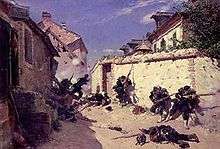Siege of Metz (1870)
| Siege of Metz | |||||||
|---|---|---|---|---|---|---|---|
| Part of the Franco-Prussian War | |||||||
 The Surrender of the French Army at Metz | |||||||
| |||||||
| Belligerents | |||||||
|
|
| ||||||
| Commanders and leaders | |||||||
| Prince Friedrich Karl of Prussia | François Bazaine (POW) | ||||||
| Strength | |||||||
| 150,000 | ~180,000 | ||||||
| Casualties and losses | |||||||
| 47,000 |
38,000 dead and wounded 142,000 captured | ||||||
The Siege of Metz lasting from 19 August – 27 October 1870 was fought during the Franco-Prussian War and ended in a decisive Prussian victory.
Background
After being held at the Battle of Gravelotte, Marshal Bazaine retreated into the defenses of Metz. There he was besieged by over 150,000 Prussian troops of the First and Second Armies on 19 August.[1][2] The French attempted to break the siege first at Noisseville and again at Bellevue but were repulsed each time.
Prelude
Napoleon III and MacMahon formed the new French Army of Châlons, to march on to Metz to rescue Bazaine. Napoleon III personally led the army with Marshal MacMahon in attendance. The Army of Châlons marched north-east towards the Belgian border to avoid the Prussians before striking south to link up with Bazaine. The Prussians, under the command of Field Marshal Count Helmuth von Moltke, took advantage of this maneuver to catch the French in a pincer grip. He left the Prussian First and Second Armies besieging Metz, except three corps detached to form the Army of the Meuse under the Crown Prince of Saxony. With this army and the Prussian Third Army, Moltke marched northward and caught up with the French at Beaumont on 30 August. After a sharp fight in which they lost 5,000 men and 40 cannons, the French withdrew toward Sedan. Having reformed in the town, the Army of Châlons was immediately isolated by the converging Prussian armies. Napoleon III ordered the army to break out of the encirclement immediately. With MacMahon wounded on the previous day, General Auguste Ducrot took command of the French troops in the field. The Army of Châlons was trapped and destroyed at the Battle of Sedan.
Siege

Bazaine was forced to surrender his entire army on 27 October because of starvation.[2][3] The Prussians offered the honors of war to the defeated French army, but, contrary to usual practice, Bazaine refused the honor.[4]
Prince Prince Friedrich Karl and the Prussian Second Army were now free to move against the French force in the Loire River area. The siege is commemorated by the "Siegesmarsch von Metz" which uses parts of the "Die Wacht am Rhein". One notable figure present on the Prussian side was the prominent philosopher Friedrich Nietzsche, who served as a medical attendant. Nietzsche contracted both diphtheria and dysentery during the siege, worsening his already poor state of health.[5]
References
- ↑ Michael Howard, The Franco Prussian War ISBN 0-415-26671-8
- 1 2 William Fortescue, The Third Republic in France, 1870-1940: conflicts and continuities, (p. 9) ISBN 0-415-16944-5
- ↑ Article on F. Bazaine in Encyclopaedia Britannica
- ↑ Howard, Michael (2013). The Franco-Prussian War: The German Invasion of France 1870–1871. Routledge. ISBN 9781136753060.
Finally Bazaine completed the shame of his army by refusing even the honours of war which the Prussians spontaneously offered.
- ↑ http://plato.stanford.edu/entries/nietzsche/